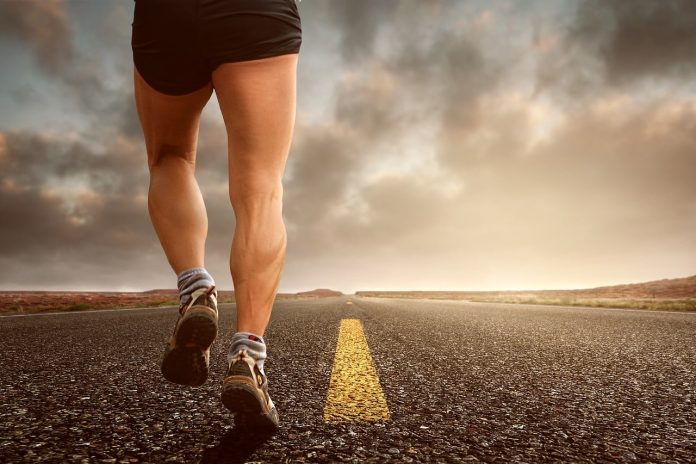By Matt Jones
The night before the Half Ironman, I can’t sleep. I am nervous about the 70.3-mile race. I am exhausted from traveling from Tuscaloosa, Alabama to Austin, Texas, from months of training and weeks of waiting for something to end that has scarcely even begun.
On the morning of the triathlon, I feel less alive than animated by raw anxiety. My parents, who have driven three hours up from Houston to watch the race, help me change into my wetsuit. It’s a little past 6:00 AM and the sun isn’t up just yet. The first leg of the race, the swimming portion, starts at Decker Lake. The gun sounds, and we enter the water by the dozen, so in the beginning, we are all over each other, kicking and colliding, fighting for space. Every few strokes, I lift my head to make sure I’m still going the right way and not careening off into the horizon—though would that be so bad? In many ways, I am already far off course. Despite the buoys and the red flags bobbing at the lake’s surface, I have entered uncharted territory. Even though I theoretically know what lies ahead, I am struck by a feeling of uncertainty.
Six months ago, on a whim, I signed up for this: 1.3 miles of swimming, 13.1 miles of running, and 56 miles of biking.
There comes a moment in the lake when I pull away just enough from the rest of the pack to find room to breathe. I turn over onto my back and see the sky streaked with orange. The sun is finally up but I do not yet feel its warmth. I can imagine that heat though, somewhere down the line, like fingers creeping up my spine or down my chest.
It is late October, and the air is cold when I climb out of the water. On the shore, a pair of volunteers rip my wetsuit off in one fluid motion. They peel it from my shoulders, down my back, and off my legs, and then I am bare to the morning air, not naked, but almost. As I stand there in my spandex jammers, spectators look on and cheer. It’s a good feeling, having these strangers root for my vulnerability, my dedication, my willingness to go on with the long road ahead. It makes me feel as if the past few months have been worth it, not just the training, but the waiting, too.
*
The night before I flew to Austin for the Half Ironman, I went out to the bars with Jess and her husband. For the past few months, outings with Jess have always included her husband, always the three of us. Two vodka cranberries in, Jess offered to drive me to my early-morning flight, and because the airport was an hour across the state in Birmingham, we decided against sleep. It was already nearing 1:00 AM, the three of us full of shots of Fireball and cheap beer. On the way back to Jess’s apartment, her husband puked in a plastic grocery bag that he dumped out the window at the next red light. When we arrived at their complex, he trudged upstairs, passed out on the bed that the two of them shared, and we were finally alone.
Jess and I sat on opposite sides of the couch and talked. At that point, that was all we ever did: talk. About what it would be like to kiss. Could we ever date? Should we? Do you love him? What if he wakes up? The only truth we had for each other was based in the hypothetical. There was something about being shrouded in the language of “if” and “then” and “would” and “should” that left me feeling like I was burning up, like I wanted to tear my skin off or at least my clothes or at least hers. But there were still miles and miles to go.
*
After stripping out of my wetsuit, I run to my rented bike, pull on a t-shirt and padded shorts, and take off through miles of hills and ranchland and sunflower fields. I quickly discover that I am a terrible cyclist. I have faltered in my training. Though I have a bike trainer set up in my living room back in Tuscaloosa, I have been busy with other things. Now, the muscles in my legs scream. My whole body screams. If you put an ear to my chest, you’d hear wailing.
I am buzzed on coffee and lingering alcohol from my night out in Alabama. I stick to the right side of the road and a fellow competitor pulls up alongside me. He is at least thirty years older than me, streaks of gray peeking out from beneath his helmet. Underneath his biking gloves there is the hint of a ring-shaped bulge. He asks if I’m okay. I think: How long do you have? Is it that obvious, that I am struggling? That I am depleted this early into the race? I want to ask him: Is it possible to fall in love with the wrong person? Is a marriage really sacred? What is more important: promises or happiness?
But in the end, I just nod. I am barely moving. The uphills feel eternal and my hands are chapped from the cold. The downhills offer a brief reprieve except for the biting wind that makes my fingers burn. I forgot to bring gloves. Lately, I have not been thinking straight.
*
With me and Jess, nothing has happened quickly or right away. Our relationship is composed of a lot of little moments stretched out across time, moments so secret I sometimes wonder if I dreamed them up. Like when she passed witty notes to me while the two of us were between clients at the campus writing center. Like when she pressed her side against mine during a round of bar trivia. Like when we skipped class and wandered the graveyard near campus. Like when she told me about her crumbling marriage and admitted that she could see a future for us. She pointed at it like someone might a constellation. You see, there’s the head, and there’s the harp, the knife, the horns. It was hard to figure out what it all meant. Harder still to explain.
The morning she drove me to the airport, we left before the sun rose. Her husband was still asleep upstairs in their bed. On the way to Birmingham, we stopped at a gas station and I chugged coffee until I felt queasy. Though we had stayed up all night, there was still so much to say.
At the departure terminal, she put the car in park. We hugged awkwardly like we were both fifteen and afraid of what might happen if our hips pressed together. I wanted to kiss her but I was terrified.
On the plane, I tried to sleep, but couldn’t. I’d never been able to sleep on planes. I was always waiting for the soft purr of the engines to die, for the plane to inexplicably fall from the sky. I spent the entire journey expectant, ready for the worst. The more I thought about it—the mechanics of staying up in the air, of keeping a secret tethered inside my body—the more I was able to imagine the sheer catastrophe of failure.
*
When I get to the last leg of the race and it is time to run, I stutter. I walk. My knees are swollen and there are hills, more hills, and then hills beyond those hills. Every couple of miles, volunteers are stationed at the sidelines. They pass out water, cookies, bananas, and little packets of gel you can squirt directly into your mouth. An overwhelming part of me wants to sit on the shoulder and simply gorge myself, but I continue on. Deep down, I know that I am incapable of quitting, despite the pain.
When I round a corner and see the finish line, I dredge up an unexpected burst of energy. Finally, there is an end in sight. I cross the finish line and am wrapped in one of those thin, shiny space blankets that are often given to survivors of trauma. Floods. Earthquakes. Fires. Heartaches, maybe.
As I walk in small circles with the blanket pulled tightly around my shoulders, I am reminded of the time I was mugged while living in Nicaragua. I ran and ran and ran then, too, and when the three men caught me, they ripped off my t-shirt before taking my keys, cell phone, and wallet. Afterward, a group of tourists from Colorado wrapped me in a blanket. They brought me to their hostel. There, I lay in a bed watching the ceiling fan spin and cried with relief that my body was enough even when it wasn’t. Though I had failed to get away, I was still alive, still breathing into the stitch in my side.
Later, back in my hotel room, I gulp ibuprofen and water. I text Jess. I want to call her, to hear her voice, but that isn’t possible. Not yet, anyway. I tell her that I can’t wait to see her. I feel overwhelmed by exhaustion, by a need to shut my eyes. I am in bed before the sun goes down, but I am too restless to sleep. My mind races and my heart pounds. My legs won’t stop moving throughout the night. There is something about knowing that your body has endured a feat you never thought possible. The simple act of being alive becomes precious, even if that living is bound up in hurt and an overwhelming awareness that you are fallible and porous, exposed in ways you don’t want to be.
*
Jess’s husband picks me up when my plane touches down in Alabama the next day. I am disappointed, though not surprised. He claps me on the back and congratulates me on the Half Ironman. He asks how the race went, but I don’t have the words to explain. I am still so, so tired. Halfway into the hour-long drive back to Tuscaloosa, I will eventually tell him: No, I didn’t win. And no, I didn’t really do that well. But I did finish, and there is something to be said for that. Though whatever that something is, I won’t say it there in the car with just the two of us, the open road, and still so many more miles to go. Because nothing is truly finished yet. This is only the beginning, after all. There are still many long nights ahead, and hills, so many hills. So many ups and downs.
Off in the distance, however, I know there is a horizon. A separation. The division of assetts. A series of angry emails and phone calls from Jess’s husband. The signing of divorce papers. For a long while, truth will live inside me like a secret. It will pace back and forth along the edges inside my body to learn the space and depth of its confinement.
I once read somewhere that if you stripped every vein, capillary, and artery from a body and laid them end to end, they’d stretch 60,000 miles. By the end of all this, I will be laid bare. I will have endured forever and then some. Still, in due time, my heart will make itself known.
Matt Jones is a graduate of the University of Alabama MFA program. His writing has appeared or is forthcoming in The Atlantic, The Southern Review, Michigan Quarterly Review, Chicago Tribune, Full Grown People, The Normal School, and various other publications.


